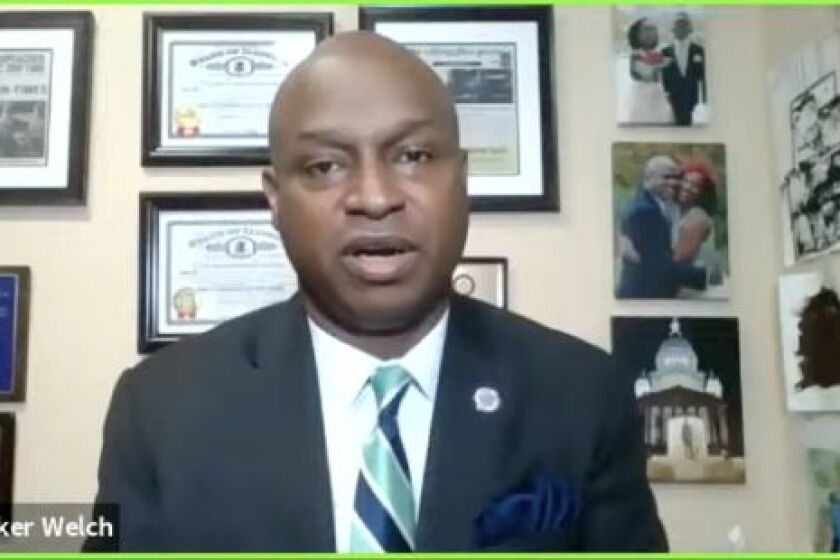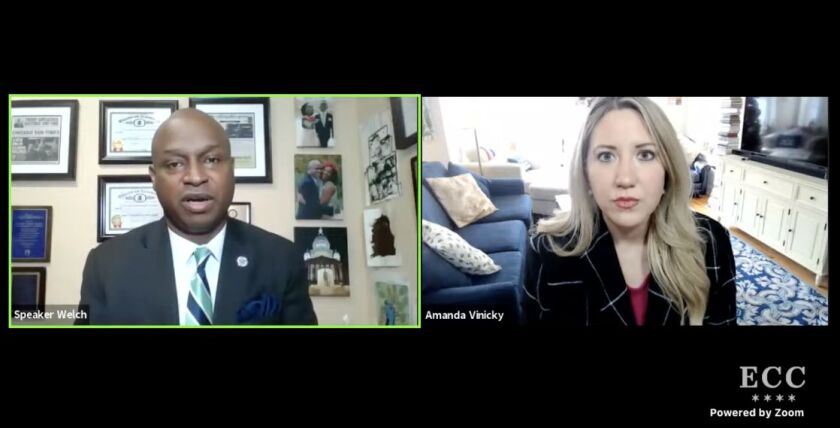Illinois House Speaker Emanuel “Chris” Welch on Wednesday declined to weigh in on who should replace Mike Madigan as state Democratic Party leader, downplayed his contact with Madigan’s short-lived House successor and defended allowing party officials to take another crack at filling the vacancy.
“If there’s a vacancy they have a right to do that,” Welch said of the Democratic leaders legally charged with making such appointments. “I do believe that different committeepeople do different things, and we could probably encourage and hope that they would do things in a more open and transparent manner.”
As for now former state Rep. Edward Guerra Kodatt, Welch said his interaction with the 13th Ward worker who filled Madigan’s seat for just three days has “been very minimal.”
Madigan backed Kodatt for the post on Sunday, but then two days later called on him to step down over unexplained allegations of “questionable conduct” and then on Wednesday scheduled a Thursday meeting to once again appoint someone to the seat.
Welch, who was chosen to succeed Madigan as speaker last month, discussed Kodatt’s sudden resignation and other issues Wednesday during a livestreamed event hosted by the Economic Club of Chicago.
The Hillside Democrat fielded questions from WTTW-TV’s Amanda Vinicky, and some audience members watching on Zoom. Welch was asked about state’s budget issues, redistricting and the process for picking replacements when elected officials resign.
He steered clear of the “inner-party squabbles” that Madigan’s resignation as chair of the Democratic Party of Illinois sparked, saying he’s going to “support the Democrat — whoever wins that race, I think, will be someone with the ability to lead our party.”
“I want that person who is leading the party to work with me to help get Democrats elected to the Illinois House, and I’m confident that any of those people … will help us get Democrats elected,” Welch said. “I think the best thing for me to do is to sit back and let that thing resolve itself.”
Madigan’s Monday resignation as party chief kicked off a scramble to replace him. U.S. Rep. Robin Kelly of Matteson, Ald. Michelle Harris (8th) and state Sen. Cristina Castro of Elgin are all interested.
On the state’s budget and fiscal issues, Welch said he was concerned that education funding was remaining flat, arguing that the state needs to “continue to build on the progress that we’ve made in education and find ways to increase evidence-based funding for federal dollars.”
Welch also voiced support for attempting to change the state income tax structure from a flat-rate to a graduated-rate system “at some point,” and suggested tying the proposal to something specific, such as addressing pension obligations, “as opposed to just asking voters to allow us to go to the progressive tax.”
“I think that’s something that we probably should really consider doing, because that’s a proven model that works,” Welch said. “Tell the voters exactly how you’re going to spend this new money, and they may trust us more.”
Voters soundly rejected the move to a graduated tax in November, leaving Gov. J.B. Pritzker to warn that some “serious and, frankly, painful cuts” would have to be made to address the state’s fiscal problems.
Those cuts didn’t materialize in the budget proposal Pritzker laid out last week.
Welch said part of voters’ rejection comes from distrust of legislators. He urged addressing that with ethics reform during the current legislative session “because we can’t serve the public if they don’t trust us.”
“Evidenced by the failure of the progressive tax, folks don’t trust us,” Welch said. “If we can rebuild that trust, it’ll be amazing what voters will help us do.”








